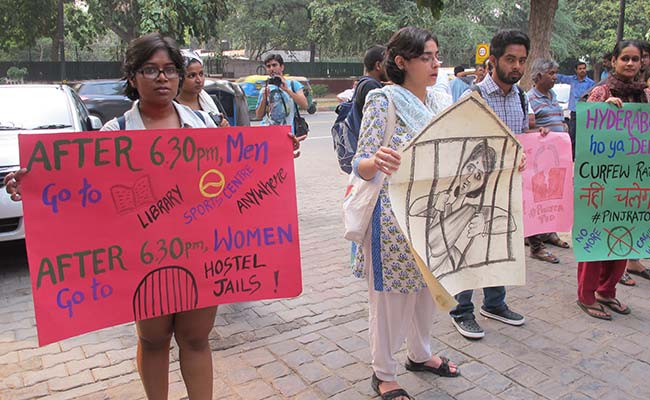DU Politics: Why Are Women At The Fringes?

NEW DELHI: A regular student of Delhi University would be able to make the following observations quite quickly in their academic years: the September vote for DUSU elections is an enormous affair and there is one group you don’t often see campaigning: women. There are several reasons for the same. The patriarchal power structure, discriminatory curfew timings, lack of encouragement, absence of party backing are only a few.
It is fascinating how the Indian democratic experience trickles down to the university level. Universities all across India aren't politically and intellectually stagnant concrete boxes. On the contrary, student protests are still as important to us as they were perhaps 68 years ago. Consequently, there have been leaders who formed the foundation of their illustrious political careers at their colleges. Arun Jaitley, Ajay Maken, Alka Lamba, Lalu Prasad Yadav and a lot of politicians started their careers with student political activism. But, women, about half of the population, have been systematically excluded from successful participation in college level politics. Very few of them rise up to decision making roles in the official student bodies. These general trends are quite explicitly manifested in Delhi University politics.
The 2016 DUSU elections made a mark for a record number of women candidates, that is 4 out of the 7, for the post of the President. Amit Tanwar of ABVP won the post. NSUI gave out the first women manifesto. But, the implicit tendency of nomination of women candidates for the sake of tokenism and fake representation is also evident. Out of the 62 former DUSU presidents, only 10 have been women.
While talking of the reasons of the considerably less political involvement of girls, Mahamedhaa Nagar of ABVP mentioned that "the kind of environment that DU politics has, it is understandable that some girls cannot participate". It is not uncommon to see hoards of men in luxurious SUVs campaigning during DUSU elections, throwing pamphlets out on the campus roads, shouting names (noticeably, not agendas). Political parties allegedly hired campaigners for the elections. The destructive combination of money, muscle power, masculinity and caste has excluded women from not just effective participation, but also an evident withdrawal from politics. Colleges like Miranda House are far less mobilised during the elections than co-ed institutions like Hindu and Ramjas.
Promises of safety of women, facilitation of sanitary napkins, women health counsellors take a backseat as soon as the party comes into power despite their noticeable mentions in their manifestoes. It won’t be unjustified to assume that this is not just because of lack of female leadership in official student bodies or a consequence of men making all the decisions, but a general inclination to disregard women, their issues and their views.
"Less participation and representation of women is somehow embedded in the power structure of society, in general. But, at college level politics, hostels become an important place for political discussion", says Madhurima, General Secretary of AISA Delhi. Political activity stretches traditional college timings and these restrictions, both from parents and accommodations, mean that women can only be involved till a certain time. Hostels and paying guest accommodations for girls have restrictive policies that are justified by people holding authority in the name of "security". Few groups fight for the abolition of these restrictions and curfews, most well-known of these is 'Pinjra Tod'. They hold some of their protests late at night. According to a member, they've faced flak, both from the authorities and the ruling political party.
According to DUSU Vice President and ABVP member, Priyanka Chawri, "the curfews are based on certain rules and regulations and security is a priority. You have to be more secure about girls. Groups like Pinjra Tod stretch activism to its boundaries. It is not at all justified to stay out after 8 PM."
Moreover, discouragement guised as friendly advice from family members and more often than not into explicit restrictions force women to pull out of political activism early. “A woman is not seen as a ‘strong candidate’, and this is not just the ABVP, but the entirety of university politics. There is a strong need for progressive growth and it’s high time more women are nominated for the President”, says Mahamedhaa.
As it happens with patriarchy, most of those who benefit from this system will fail to acknowledge the need for annihilation of this blatant sexism. There is an obvious necessity to include women in the political fold, not just as tokens, and that process is inclusive of university politics. The number of women who've created a niche for themselves in the political arena is significantly less and not likely to increase unless hostel and PG accommodation curfews are abolished, until political parties change their patriarchal stance and money, muscle and masculinity are no longer symbols of university politics.



